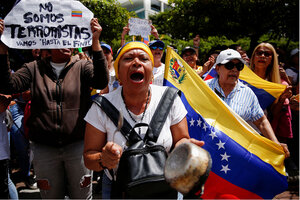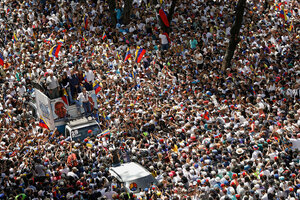Venezuela’s Maduro clings to power. Opposition hopes this time it ends differently.

Venezuelans protest election results granting President Nicolás Maduro a third term, in Caracas, Venezuela, Aug. 3, 2024.
Leonardo Fernandez Viloria/Reuters
Caracas, Venezuela
For more than a decade, Venezuelans opposed to the government of President Nicolás Maduro have experienced moments of soaring confidence that change was on the horizon. And just as often, that hope faltered when the government successfully cracked down on protests, meddled with elections, or stamped out popular opposition candidates’ burgeoning power.
But in the lead-up to the July 28 presidential election, hope was higher than ever. And thus, with Mr. Maduro’s baseless claims of victory – which the United States, the European Union, and other governments say they won’t recognize – has come even more crushing disillusionment. A week after the highly contested presidential vote, the population is once again facing a moment of potential change.
The opposition has taken to the streets, with thousands gathering in the capital on Saturday to demand that Mr. Maduro step down. They’re sending a message that they’re unwilling to entertain more of the same governance that has sent Venezuela reeling in recent years amid economic, political, and humanitarian crises.
Why We Wrote This
As Venezuelan President Nicolás Maduro clings to power following an internationally contested election, citizens hoping for change are leaning into the resilience they’ve built over the past decade.
The government has lashed back, with growing crackdowns and violence against opposition demonstrations. On Sunday, Mr. Maduro urged military chiefs to order a “total deployment” of their troops, and told members of the national guard, “We are confronting, defeating, containing, and pulverizing an attempted coup in Venezuela.”
Now many Venezuelans are grappling with how to move ahead amid both hope and fear, leaning into the resilience they’ve had to build over the past decade to navigate this fraught moment.
“If change doesn’t happen now, the Venezuelan people’s hope will fall – or relapse as it did in the past,” says Enyerberth Alexander Laguna Rondón, a content manager in his late 20s who participated in the opposition’s pro-democracy march last Thursday.
Protests and repression
The day after the contentious vote and Mr. Maduro’s claims of victory – without any proof – protests erupted across Venezuela. Statues of Hugo Chávez, the popular former president who laid the foundation for Mr. Maduro’s government ideology chavismo, were torn down. The streets were filled with tear gas, gunfire, and flames launched by government sympathizers. Unlike previous protests, which were predominantly led by a politicized middle class, these demonstrations were largely driven by people from low-income neighborhoods that used to be government strongholds. Even parts of Mr. Maduro’s core base have turned against him.
In response, Mr. Maduro unleashed the harshest crackdown of his 11 years in power. At least 22 protesters have been killed over the past week, and the government arrested more than 2,000 people. Just a block from Mr. Rondón’s house, a young man was shot and killed while demonstrating.
“The government uses fear as a means of social control,” says José Gregorio Guerra, a Venezuelan sociologist. It relies on tactics such as raiding the homes of government opponents or their relatives, and encouraging citizens to report criticism of the government.
The strategy has worked. Government repression and intimidation have compelled some protesters like Mr. Rondón to remain at home in recent days. The killing just around the corner from his house left him shaken and overwhelmed. “I don’t want to become a martyr of my country. I would give a lot for my country, Venezuela, but I wouldn’t give my life,” he says with tears in his eyes.
Despite his retreat from the streets, Mr. Rondón admires those who continue to stand up against the government’s fraudulent claims of victory. Mr. Maduro, backed by the loyalist National Electoral Council, announced without detailed breakdowns of the votes or verifiable evidence that he won with 51% of the vote. Opposition candidate Edmundo González Urrutia, a retired diplomat, claimed victory based on the preliminary results of 80% of voting center tallies, collected and protected by over 1 million citizen volunteers. His team claims he won with 67% of the vote.
Carlos Mendoza, a government employee in his early 20s, is among the young Venezuelans still pushing ahead with protests.
As is common among government employees, he says he was pressured by his boss to attend the government’s closing campaign event just over a week ago to show support for Mr. Maduro.
But on Aug. 3, when his boss asked him to attend the government’s election celebration, Mr. Mendoza refused. There could be professional repercussions – no small thing in a nation where the economy is in shambles and hyperinflation distorts purchasing power. But “I cannot abandon Venezuela; I cannot stay at home with my arms crossed,” he says.
At the opposition’s rally over the weekend, Mr. Mendoza felt a surge of energy and hope. However, he’s also experienced the harsher side of standing up for democracy. After celebrating Mr. González’s presidential victory on Tuesday, he found himself hiding from tear gas and being chased through streets of Caracas, the capital, by armed forces.
A heavy toll
Nearly all of Venezuelan psychologist Zena Sleiman Dayoub’s patients are experiencing pervasive fear right now, she says. “They feel they are not safe anywhere,” even clients who do not consider themselves politically active, she says.
Years of shortages of basic services and medical and food products, as well as widespread institutionalized violence, feed into the far-reaching anxiety, says Dr. Sleiman. “This is such a [challenging] situation; lots of energy is consumed to process it all,” she says. “It’s more important than ever to take care of ourselves.”
Now the question Venezuelans – and the world – are asking is whether the South American nation will descend further into dictatorship or move toward a democratic transition, says Dr. Guerra, the sociologist, who for about a decade has run support programs for Venezuelan activists.
The repression “is not enough to stop them,” Dr. Guerra says of Venezuelans tired of years of basic shortages and lack of opportunity.
Holding out hope
But if Mr. Maduro holds on to power, it wouldn’t be the first time Venezuelan hopes for change were dramatically quashed. Widespread political protests in 2014, 2017, and 2019 didn’t yield the results demonstrators hoped for. Nearly 8 million people, representing a quarter of the population, have fled the country due to hunger, political repression, lack of security, and despair.
Many question whether the opposition movement can survive another dramatic disappointment.
Some might abandon the fight. Mr. Rondón, alongside about one-third of Venezuela’s remaining population, is considering leaving the country if Mr. Maduro successfully clings to power. Whether they stay on under Mr. Maduro or migrate, Venezuelans will be dealing with a sense of loss, says Dr. Sleiman, the psychologist.
But, she adds, hope for democracy in Venezuela can’t be crushed entirely. She draws comparisons between the heartache of watching the nation’s promise crumble and that of dealing with an earth-shattering breakup. It’s tempting to reject the idea of falling in love again – or in this case the idea of successfully rebuilding independent institutions and the economy.
But, she says, Venezuelans shouldn’t be afraid to hope and they shouldn’t fear the potential disappointment that comes with having faith that things can change.
“It is a part of living,” she says.

